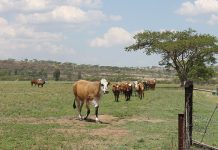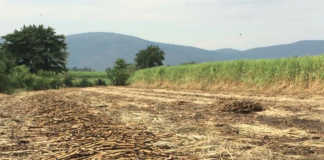This is usually half way up the koppie behind the house, on the dam wall or by the kitchen’s back door. And even then you’d be lucky to get a steady two-bar signal! Apart from the obvious frustration this lack of connectivity can cause, it is also one of the many symptoms of poorly developed rural infrastructure – and one of the main reasons cited by a new generation of young people for opting out of a career in farming.
Young Africans were “looking at everything but farming,” according to Dalitso Mbewe, a Zambian farmer and representative on the PAN African Youth Council. Mbewe participated in a discussion on ‘Youth in Agriculture’ during Massey Ferguson’s recent Vision of the Future event held at AGCO’s Future Farm in Lusaka.
Mechanisation solutions for smallholder farmers launched by @AGCOcorp in Zambia #MFvision @FarmersWeeklySA pic.twitter.com/ULpYGUnheV
— Denene Erasmus (@agri_erasmus) April 8, 2016
“Young people don’t want to live in a place where they don’t have a cellphone signal,” said Mbewe.
Alan Jagoe of Ireland, president of the European Council of Young Farmers, who also participated in the discussion, said rural development, and especially the upkeep of rural areas, was certainly a challenge for farmers in Europe as well. However, according to him, the two main obstacles young farmers in the EU faced were access to land and finance.
A survey conducted by Agri SA in 2015 showed that the average age of farmers in South Africa was 62 years or older. According to the International Food and Agribusiness Management Association, the average age of farmers in the US was 58 years, in Japan it was 67 years, and more than one third of European farmers were older than 65. According to Jagoe, only 7% of farmers in the EU were younger than 35.
Mbewe and Jagoe agreed that the situation could be improved by changing some of the terms according to which financing is approved for farmers. More importantly, they spoke about a change in mindset that needs to happen in young people today, regarding the type of lifestyle that farming offers. Young Europeans must understand that one does not have to own land to be a farmer, and young Africans need to be convinced that farming is not necessarily a dirty job and a poverty trap.
The farming sector is obligated to actively pursue and inform this present generation about the multitude of new technologies available to farmers – ones that will radically change the way we produce food and fibre in the future.
In addition, governments need to change their perceptions regarding the types of farming that must be supported and encouraged, if they want to successfully attract young people to the industry. A government cannot, as a young Ugandan farmer told me recently, encourage anyone to become a farmer by providing every farmer in the country with a state-purchased hoe and other hand tools. “Those tools belong in a museum,” my Ugandan friend said.













